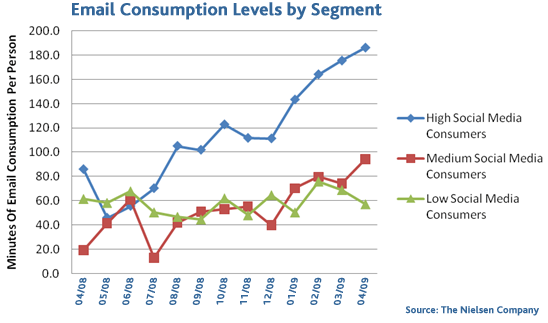Barely a month goes by without some self-appointed guru or illusory luminary making headlines by stating that email is dead. In the time it took you to read that sentence, over 20 million emails were sent.
Since in a free society anyone is free to say anything they want, no matter how ludicrous, it seems that these email pessimists are not paying any attention whatsoever to reality. Legitimate statistics from the worlds leading and most respected survey organizations prove that email marketing is far from dead, but is thriving and expanding as never before.
Here are the top five reasons why email is not going away in fact its growing in popularity on what is close to an exponential curve!
1. Email marketing volume is up 61% in 3 years
A recently released email marketing survey by Responsys demonstrates that the volume of emails sent by ethical and reputable marketers hit an all-time record level last year, with Nov. 29, 2010 (better known as Cyber Monday) being the date when the highest level of marketing emails were sent. The overall volume of emails being sent by both brick & mortar commercial and e-tailer companies was up by a staggering 61% since 2007.
2. Email reaches a quarter of the worlds entire population
There are currently over 1.5 billion email users and this figure is forecast to reach the 2 billion mark in just two years.
Given the current market penetration of computers, smartphones and other email-enabled devices, these numbers translate into virtually every single web-accessing individual in every country in the world regularly using email.
According to the World Bank, 5.5 billion people on earth live on less than US $10 per day, therefore it can be extrapolated that email is used by individuals who live above the poverty level to nearly total saturation.
3. Email is immediate and anticipated
Fully 57% of all adult American internet users check their email at least on a daily basis, with many of them checking it much more often than once a day.
Email marketing newsletters and missives solicit an expectation and anticipation in the subscriber, which translates into the content being welcomed rather than shunned as in the case of many other online advertising and promotional approaches.
As email marketers everywhere are meticulously pruning their lists of inactive and other non-responsive subscribers, the result is that the consumers who are on the current lists are engaged, motivated, and ready to absorb the marketing message.
4. Social media is fueling the popularity & reach of email

Leading survey company Nielsen reports that among those individuals reporting that they are using social media to a greater extent since the previous year, 44% state that they are actually using email even more than that! The rise in usage of email is not limited to social networking aficionados, as 22% of all people who have not yet taken the social media plunge also report that they are using email more often now.
5. Email marketing acceptance is strong in young adults
As soon as teenagers graduate from high school, their email use skyrockets especially if they are going on to college, university, or entering the workforce. The critical and powerful 18-30 year old demographic relies heavily on email as the backbone of their online communications activities. This age group keeps its email preferences solidly as they age and statistics prove that their email usage continues to increase as they grow older.
Email marketing continues to grow by leaps and bounds: leaping and bounding over all the skeptics and false prophets. The Direct Marketing Association has proven that for each dollar invested in email, the marketer can expect to generate a Return On Investment of $43.52! With that sort of ROI and continued growth, its very clear that email marketing is here to stay.
Since starting to read this article, over 775 million emails have been sent
Got mail?

